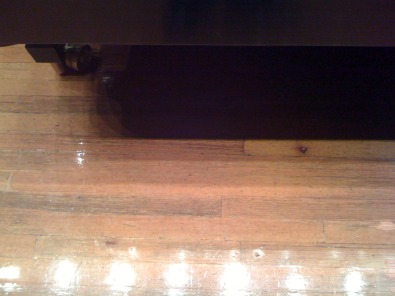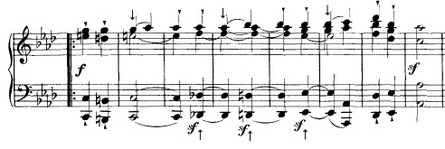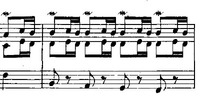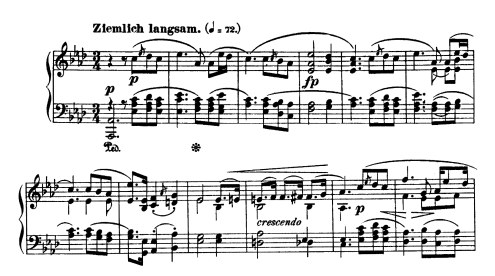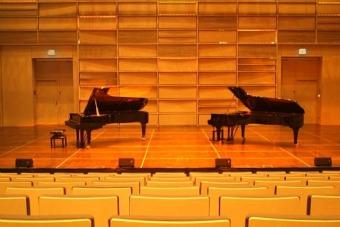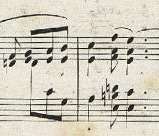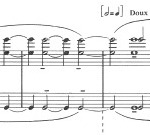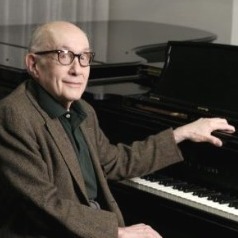Five recent Tweets of mine -- please pardon the cross-platform redundancy. April 21, 2011 In a way our technology is putting sound and music back together -- as perhaps the technology of writing took music and sound apart. April 20, 2011 Yes, some of Rachmaninoff's music is very much part of the "Back to Bach" movement. April 20, 2011 It's not surprising composers borrow or steal so much -- if you consider that we are all just adding … [Read more...]
Voice Mis-Leading
Some solo piano music has part-writing that seems to correspond directly to music for string quartet. In such keyboard music, there are a constant number of "voices" tracing coherent individual lines. Beethoven: Opus 110 These voice-parts have integrity. We can follow tenor or bass, alto or soprano (viola or cello, second violin or first violin). This is a modern practice in keyboard music, I believe. The earliest keyboard pieces -- … [Read more...]
Nothing ventured, nothing lost
Can it be that aspiring musicians do not enter competitions because they don't want to lose? It might make sense. Or it may be an easy way out. I'm surprised by the competition-reticence of some young pianists. Not suffering disappointment in competitions may keep an artist's work and motivation pure. Not being known to have lost competitions may be useful professionally. Or, lacking the severe scrutiny of the competition platform, a player's … [Read more...]
Thinner Air, Up There
In many a notated German Dance or Ländler (or in its second part), there are rocking passages in regular eighth-notes featuring the interval of the sixth. On the violin, such lines can involve back and forth string-crossing, bariolage. Often a low pitch in the passage (open string) remains constant. Such music resembles and may signify yodeling. Making music across the voice break is a recurring feature of instrumental music by Schubert, and … [Read more...]
To the left
There was a nail in the old Carnegie Hall stage floor that marked the precise spot where the leg of Vladimir Horowitz's piano was to be positioned. Neurosis? Or careful attention to sonic detail? I was not very satisfied with the way I was playing -- near the end of a three-hour rehearsal at Wigmore Hall in London. My friend David Rick suggested that the piano be moved back, much closer to the rear wall of the Wigmore stage. The move was made … [Read more...]
Pat head, rub tummy
Within solo piano music, it happens that the individual must play two very differing things at the same time. In Beethoven's Opus 110, the right and left hands have different patterns of articulation and emphasis. For me, it would be best if the heavy, syncopated comic accents in the left-hand music do not in any way affect the folk simplicity of the paired-note articulation above, in the highest voice in the right hand part. In doing these … [Read more...]
Departure
In J. S. Bach's Capriccio, BWV 992 I noticed strongly emotional content in an unusually repetitious passage -- a place where as the keyboardist's right hand stays in place repeating a simple figure the left hand incrementally departs physically, signifying departure, descending step by step lower and lower. Something similar occurs in Schubert's G-flat-Major Impromptu: … [Read more...]
Texts for the Memory
Repurposing of musical passages -- especially repeating a passage modified with a different continuation -- was useful efficiency in the writing of music to be read by amateurs in the living room. Those same ways of constructing phrases pose memory puzzles for the professional player delivering the music in a public concert. Scripts of old plays were memorized by actors, making use of all the considerable techniques of the memory arts of the … [Read more...]
What if?
What if our classical music is really much more varied, confusing, and more disorderly than we make it sound in playing today? What if the wordless instrumental music of Mozart and Beethoven encodes and encloses so many references to the specifics and generalities of living Italian comic opera that we're in the dark without it? What if in the great regularizing of the bow, the beat, subdivisions, fingerings, registers high and low, we … [Read more...]
Simultaneous transmission
Next week, I'm playing an overlapped, simultaneous concert with Francesco Tristano, this time at Le Poisson Rouge in New York. It's billed as "[ Simultaneo ]." In the advertising it says: "Two concerts at the same time!" A manifestation of remix culture for sure -- it's Girl Talk Classical! In Echternach in 2009, we did an overlapped performance, a continuous 70 minutes of sound made with two pianos. Glass's music was overlaid with Carl Craig. … [Read more...]
Used Up — or Barely Begun?
Is the most famous classical music so familiar, so often performed, that it's worn out? I've listened to Beethoven's "Appassionata" so frequently that it's rather difficult for me to hear the music, to accurately sense the real sound patterns being made on a particular occasion. (The mind slips into a "this-is-how-it-goes" mode that dulls perception.) Are icons like the Fifth Symphony or the opening of Carl Orff's Carmina Burana being used up as … [Read more...]
Lost Temper
In a good recent demonstration, Jonathan Bellman suggested that sequential passages in Chopin's piano music have greater content with less equally tempered tuning. The specific pitch proportions within intervals would have subtly changed as key-area changed, with the less equalized tuning of 19th-century pianos. Equal temperament remains a theory but is not a practical piano reality even today. Just listen... Technicians in my school … [Read more...]
Line break
In Cesar Franck's Prelude, Chorale, and Fugue, the crescendo which is marked in measure 65 probably continues to m. 67. In the Henle edition of the piece (and others), there's a line break after m. 65. Playing for me, a young pianist finished the crescendo at the end of the printed system (where the line break occurs), not continuing the swell into m. 67. Pianists are visually suggestible. Switching to a new edition of a familiar piece, with … [Read more...]
The Second Year of Pianomorphosis Posts
December 17, 2009: Rattle December 21, 2009: Early adopters December 28, 2009: Change of venue December 30, 2009: Screening January 5, 2010: Drunk January 11, 2010: Tract January 25, 2010: Costly Imitation February 1, 2010: Kindest Cuts February 8, 2010: Rise February 16, 2010: Forest February 22, 2010: First Note March 1, 2010: Scripture reading March 8, 2010: Overwhelmed March 16, 2010: Repertoire Inflation March 23, 2010: … [Read more...]
Jacob Lateiner (1928-2010)
Jacob Lateiner died this morning in New York. He was 82. The following passages are from my 1998 essay about his teaching: "In a sense, Jacob Lateiner does not give piano lessons. The piano is a tool for him. It's a means or an obstacle to singing, speaking, and (fuga!) flying. In lessons, Jacob aims to be neutral. Part Socratic (or Talmudic?) questioner, part Freudian analyst (to the exactly punctual end of each session), Jacob allows his … [Read more...]



